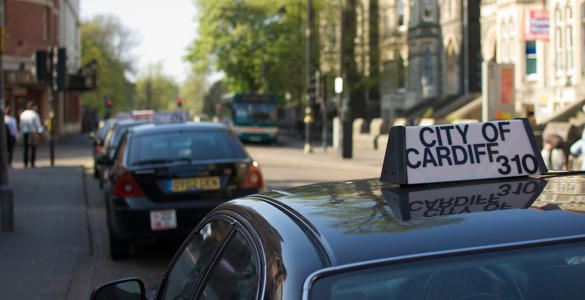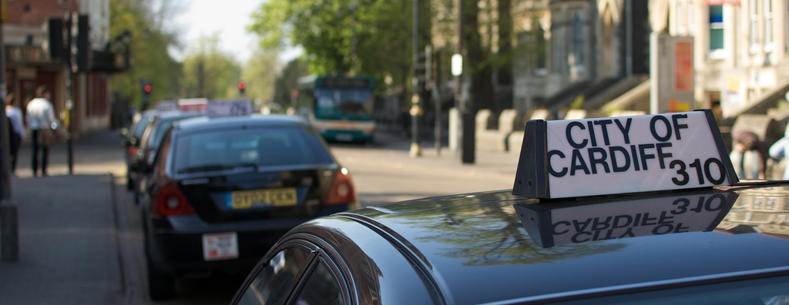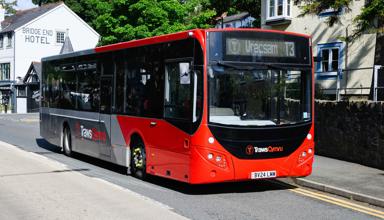Under the current devolution settlement, the licensing of taxi and private hire vehicle (PHV) drivers, vehicles and operators is the responsibility of the Secretary of State for Transport and is not devolved.
In its review of legislative powers for Wales, the Silk Commission recommended further devolution of transport powers (see Part 2, Chapter 7 for details), including taxi regulation, to ”create simpler and more coherent arrangements and facilitate the development of a more integrated transport strategy for Wales”.
Once implemented, the Wales Act 2017 will devolve competence to legislate for the licensing and regulation of taxis and PHVs to the Assembly. The Welsh Ministers will also gain executive competence to make certain regulation making powers via amendments to the Transport Act 1985.
In anticipation of these changes, the Cabinet Secretary for Economy and Infrastructure, Ken Skates, is scheduled to make a statement in Plenary on Tuesday 23 May outlining the Welsh Government’s plans for a consultation on its proposals for the reform of taxi and PHV licensing.
What are the licencing arrangements for taxis and PHVs currently?
Licensing of taxis and PHVs in England and Wales is currently the responsibility of local authorities. Licensing operates on a two-tier system that distinguishes between: taxis, which can be hailed or can use taxi ranks as well as undertaking pre-booked journeys; and PHVs, which must be pre-booked. The Department for Transport has published best practice guidance to assist local authorities in carrying out their functions. The licence conditions applied to taxi and PHV drivers and their vehicles are specified by each local authority and vary from area to area.
The DfT publishes data on taxis, PHVs and their drivers. Data for licensing policies (MS Excel Spreadsheet, 260KB) illustrates how policies differ across licensing areas. In Welsh licensing areas as at 31 March 2015 for example, 10 of the 22 local authorities had a requirement that wheelchair accessible vehicles be included in each company’s fleet. On driver training, 4 of the 22 local authorities (Bridgend, Cardiff, Ceredigion and Rhondda Cynon Taf) have a requirement for disability awareness training for taxi drivers and 3 (Cardiff, Ceredigion and Rhondda Cynon Taf) have the same requirement for PHV drivers.
The Law Commission’s review of taxi and PHV services
The Law Commission conducted a review into taxi and PHV services between 2012 and 2014. In response to the Law Commission’s proposals, Welsh Government officials indicated their preference for a single-tier system, describing the distinction between taxis and PHVs under the current two-tier system as “meaningless to consumers”. On national safety standards, the officials stated:
There should be a national framework for standards, and those should be the same for taxis and PHVs. Local licensing authorities should be able to stipulate their particular requirements using the framework to reflect local circumstances.
[…] It is difficult to see why safety standards for taxis should be any different to those required of PHVs. Introducing a single set of safety standards for taxis and PHVs would avoid the risk of a mismatch in taxi and private hire standards.
The Law Commission published its final report (PDF, 2MB) and a draft Bill (see appendix A of the report) in May 2014, setting out its vision for a new single legal framework for the regulation of taxi and private hire services across England and Wales. The report’s recommendations included:
- Retaining the current two-tier system;
- Common national standards for vehicles, drivers and dispatchers to be determined by the Secretary of State with local authorities retaining responsibility for licensing;
- That licensing authorities should retain the right to limit the number of taxis working in their licensing area; and
- Improved equality and accessibility by requiring all drivers to undergo disability awareness training.
Has the Welsh Government indicated what it is proposing?
In evidence to the Petitions Committee (PDF, 556KB) during its consideration of petition P-05-710, which calls on the National Assembly for Wales to urge the Welsh Government to ensure that disabled people can access public transport as and when they need it, Ken Skates stated:
It’s my intention to consult on a number of proposals regarding taxis and private hire vehicles in order to implement national standards that will not distinguish between taxis and private hire companies.
[…] I’d like to see improvements in terms of training for drivers of buses and trains and taxis and private-hire vehicles as well. I’d like to consult on standardising regulations for taxis and private-hire vehicles.
[…] Introducing national standards that are implemented consistently across Wales will help achieve this [standardised level of service and an end to disabled people being disadvantaged in terms of PHV services], and it will relate not just to the quality and the safety of the passenger experience, but also to the training that's provided to drivers.
In responding to a question (PDF, 286KB) on the need for common national standards as part of the same inquiry, Steve Wright from the Licensed Private Hire Car Association and John Forsey from the highways, transport and recycling department of Powys County Council highlighted the potential for cross-border issues with differing licensing regimes in England and Wales.
Article by Sean Evans, National Assembly for Wales Research Service.
Image from Flickr by Mark Turner. Licensed under Creative Commons.
This post is also available as a print-friendly PDF: Taxi licensing reform: What changes lie on the road ahead? (PDF, 166KB)






